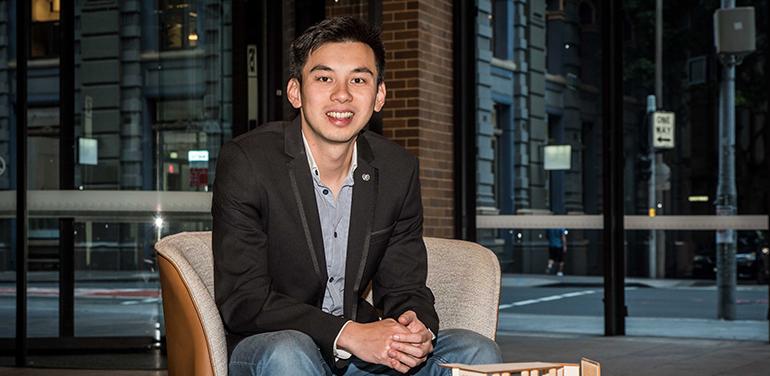Australian City Leader HY William Chan Named OBEL Award Teaching Fellow
Sydney architect and emeritus councillor HY William Chan has been named a recipient of the prestigious OBEL Award Teaching Fellowship, a globally renowned architecture honour. Recognising leading practitioners shaping the future of the built environment, the Fellowship will see Chan join the School of Architecture at the University of Technology Sydney (UTS) in 2025 to advance education in sustainable city-making.

Credit: Sara Legnaro
Representing a new generation of urban leaders, Chan is recognised for his expertise in integrating design excellence, policymaking and climate resilience. As the youngest-ever councillor in the 180-year history of the Sydney Lord Mayoral government, his leadership embodies an interdisciplinary, community-driven approach to addressing the challenges of urbanisation. Chan’s design practice aligns with this year’s Fellowship theme, ‘Seminal Solutions to the Challenges Facing Cities’.
The OBEL Award Teaching Fellowship, established by the Denmark-based Henrik F. Obel Foundation, champions forward-thinking practitioners who redefine architecture’s role in society. The Foundation commended Chan for his ability to merge architectural expertise with civic leadership, positioning him as an ideal mentor for future architects.
“We are enormously happy to bring the second cycle of the OBEL Award Teaching Fellowship to UTS, further building on the special relationship between our two countries and building on the friendships forged when hosting the 2023 OBEL Award celebrations in Sydney. We look forward to supporting HY William Chan as he shares his expertise and passion for sustainable city-making with the student body at UTS. The OBEL Award and its supporting programmes are dedicated to addressing the challenges of our built environment by contributing new ideas and knowledge. Sharing this with the next generation of changemakers is what the Teaching Fellowship programme is all about,” said Jesper Eis Eriksen, Executive Director, OBEL Award.
At UTS, Chan will lead postgraduate design studios focused on encouraging students to balance long-term public needs with evidence-based aspirations in creating civic projects that serve the public interest.
"The OBEL Award Teaching Fellowship is a catalyst to inspire future generations to think beyond traditional design approaches and engage with the realities of governance and community building. Architecture is deeply intertwined with the political, social and environmental systems that shape our cities, and I look forward to exploring these intersections at UTS," said Chan.
Chan’s policy-making influence extends beyond Sydney. As an adviser to the United Nations, he recently served as head of delegation to the UN’s 2024 Summit of the Future, World Urban Forum and COP climate negotiations. His international expertise will provide a global perspective for students at UTS, enriching their understanding of sustainable urban development and city diplomacy.
By understanding both the global scene and the local context, Chan’s teaching will seek to impact students beyond their city – including grappling with issues of climate change, politics, social justice and housing needs. Relying on the power of design to support and enhance change, Chan will use both theoretical teaching and practical local cases to test ideas and solutions.
“We are delighted to host the OBEL Award Teaching Fellowship which aligns with our School’s priorities to tackle pressing societal and global concerns around climate change, inclusivity and equity through our pedagogy and research. Through the Obel Foundation, the School’s collaboration with Chan presents a unique opportunity to equip future architects and designers address these pressing challenges facing Australia’s global city, Sydney while engaging with the realities of climate-led urban practices and policy”, added Professor Leena Thomas, Head of UTS School of Architecture.
Chan views the Fellowship as an opportunity to democratise city-making. “Urban development in Australia has traditionally been shaped by systems that exclude marginalised voices. I am passionate about working with emerging designers to make these processes more inclusive, ensuring that younger and more diverse people have a meaningful role in shaping the future of our cities,” he said.
The OBEL Award’s commitment to fostering global collaboration and promoting architecture’s transformative power is exemplified through the Teaching Fellowship. Chan’s appointment not only highlights his contributions to future practice but also sets a precedent for integrating design and civic governance in architectural education.
About the OBEL Award
The OBEL Award is an international award that promotes architecture in the service of both people and the planet. It aims to honour outstanding architectural contributions to social and ecological development globally. These contributions should offer seminal approaches to urgent problems, a commitment towards the common good.
The award focuses on the collaborative and cross-disciplinary elements of architecture and values the plurality of architecture as a practice. The OBEL Award works, through various activities, to demonstrate influential ideas and approaches that can spearhead and seed future architectural developments, and drive architectural discourse and education.
About OBEL Award International Teaching Fellowships
The OBEL Award Teaching Fellowships aim to bridge the gap between professional practice and academia by fostering discussion and learning around the award’s key themes. These themes reflect urgent global challenges and showcase the potential of architecture and design to positively impact our built environment.
The purpose of the OBEL Award Teaching Fellowship is to support universities in introducing new ideas and pedagogies into their institutions while leveraging the knowledge and experience of professionals to contribute to academic teaching.

